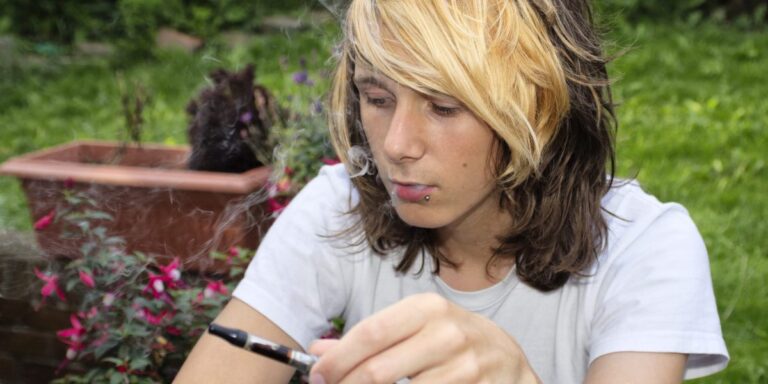
While the United States languishes On e-cigarette reforms, Australia on Monday introduced some of the world’s most restrictive vaping laws as part of a global effort to combat what the World Health Organization calls a “alarming“Increase in vaping among young people.
With immediate effect, the reforms prohibit the supply, manufacture, importation or sale of a vaping device outside a pharmacy in Australia. The ban applies to all e-cigarettes, whether or not they contain nicotine.
Under the new regulations, Australians must also have a prescription from their GP to buy a vape. At the pharmacy, they will have a limited choice of three flavours: menthol, tobacco and mint, and will need to engage in a discussion with the pharmacist before making a purchase.
The nicotine concentration in these vapes will be controlled and their packaging will be “pharmaceutical type,” according to the InvoiceThe law aims to combat the “scourge” of recreational vaping, Health Minister Mark Butler said in a statement.
“It’s a public health threat, particularly for children and young people,” Butler said. About 22 per cent of Australians aged 18 to 24 reported using e-cigarettes or vaping devices at least once, according to government data. data Last year, this was demonstrated. Yet, at least 61% of these vapers in a similar age group expressed a desire to quit, according to The Associated Press.
The laws will “return e-cigarettes and vaporizers” to their original purpose: a therapeutic remedy for quitting smoking, the Health Ministry said in a statement after the law was passed.
Why Australia’s approach is unique
Many countries have recently taken steps to regulate their e-cigarette market. According to a 2023 study, no fewer than 121 countries or territories regulate electronic nicotine delivery systems. WHO report. Of these countries, 33 have completely banned the sale or importation of vapes, although the e-cigarette black markets are thriving in some of these countries, notably India and Turkey.
Australia’s prescription-based model is unique, but many of the country’s other reforms have been replicated by its affluent peers. Australia banned disposable e-cigarettes from January 1, and the United Kingdom quickly followed, then went further by banning tobacco sales to anyone born in 2009 and after, in a bid to create a “smoke-free generation.”
In the United States, regulation has evolved much more slowly. FDA has only approved 27 tobacco products– and menthol-flavored e-cigarette products and devices, primarily from popular brands such as NJOY and Vuse. Notably, other brands such as Juul, Lost Mary, and Elf Bar are not on the list, and these vapes continue to be sold illegally. Chinese e-cigarette manufacturers are also flouting restrictions on vapes, which millions import flavored disposable vapes into the US market.
Last month, U.S. politicians criticized top public health officials for failing to enforce their own laws during a controversial hearing on youth vaping.
“You’re failing!” Judiciary Committee Chairman Dick Durbin (D-IL) said during a heated exchange with Deputy Attorney General Arun Rao, representing the Justice Department. The officials pledged to move more quickly on enforcement during the meeting.
Gaps and problems in the law
Although Australia boasts “world-leading” reform of vaping restrictions, its new law already has gaps. Under a last-minute amendmentRestrictions will soon ease slightly. From October, adults over 18 will no longer need a prescription, but will need to have a “conversation” with their pharmacist before buying an over-the-counter vape. Children under 18 will still need a prescription to buy a vape.
Additionally, e-cigarettes purchased in Australia can have a nicotine concentration of up to 20 mg/ml, which is the limit imposed by many other countries. In the United States, e-cigarettes containing more than double this nicotine content dominate the marketaccording to Truth Initiative, a nonprofit tobacco control organization.
A previous version of the Australian law already required a prescription to buy e-cigarettes, which could be sold more widely, but retailers were able to circumvent the law claiming that their vapes do not contain nicotine. Young people have discovered easy to get these vapes.
But now that it is illegal to sell e-cigarettes outside pharmacies, the law effectively shifts the burden of managing the national supply of e-cigarettes from tobacco shops and retailers to pharmacists.
The Pharmacy Guild of Australia, which represents pharmacy owners across the country, opposite the bill, arguing that they did not want to sell “highly addictive” e-cigarettes without a prescription.
“The Senate’s expectation that community pharmacies become vape retailers and vape waste collectors is insulting,” the guild said in a statement.
It will now be up to individual pharmacies to decide whether to sell vaping products. Pharmacists will have to verify the age of the buyer, provide them with advice on quitting smoking and ensure they have not purchased more than a month’s supply. It is not yet clear what this stock represents or how it will be quantified.
While illegal vape sellers could spend Up to seven years in prison for violating the new provisions, the law does not criminalize possession of quantities of vapes for personal use, including illicit ones. A person can have up to nine vapes on them at a time, according to The GuardianThere will be a 12-month amnesty period, during which people with more than nine vapes will be able to return or dispose of their excess vapes.
Michael Bonning, a spokesman for the Australian Medical Association, the country’s leading doctors’ group, said the new law would create a “step change in the accessibility of e-cigarettes”.
“These are major reforms that doctors and all health professionals have been calling for,” Bonning told the Australian Broadcasting Corp.
However, it is not yet clear how the retail ban will be enforced. On Monday, several convenience stores and tobacconists continued to easily sell their flavored nicotine products. Guardian reported.
“No ban. We’re still selling,” a cashier at a supermarket in suburban Melbourne told The Daily Mail. Guardian.


